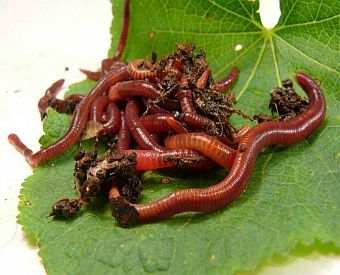Premium Top Quality Red Wiggler Worms - Enhance Your Garden's Fertility
Premium Top Quality Red Wiggler Worms - Enhance Your Garden's Fertility
Blog Article
Red Wiggler Worms Demystified: Unlocking the Keys of Vermiculture for Greener Living and Nutrient-Rich Dirt
In the world of sustainable techniques for improving soil high quality and promoting eco-conscious living, red wiggler worms play an essential yet frequently overlooked duty. Red Wiggler Worms. Comprehending the intricacies of caring for these worms, enhancing their setting, and utilizing their spreadings can lead to a greener way of life and much healthier soil for plants to flourish.
The Duty of Red Wiggler Worms
Red Wiggler worms play a vital duty in composting systems by effectively damaging down natural matter right into nutrient-rich spreadings. These voracious eaters consume a variety of organic materials, such as kitchen scraps, backyard waste, and paper items. As they feed, the worms' digestion procedures break down the natural issue into a penalty, dark, and nutrient-dense product understood as worm spreadings or vermicompost.
The spreadings produced by Red Wiggler worms are very useful for soil health and plant development. They are rich in essential nutrients like nitrogen, potassium, and phosphorus, which are crucial for supporting healthy plant development. Additionally, worm castings consist of valuable microorganisms and enzymes that aid boost dirt framework, rise water retention, and boost nutrient uptake by plants.
Advantages of Vermicomposting

Additionally, vermicompost, the nutrient-rich output of vermicomposting, acts as an outstanding organic plant food and soil conditioner. It improves dirt structure, boosts soil oygenation, and enhances dirt moisture retention. These residential or commercial properties add to much healthier plants with stronger origin systems and far better resistance to conditions and insects. Vermicompost also improves the dirt with vital nutrients like potassium, phosphorus, and nitrogen, promoting plant growth and overall soil fertility.
Additionally, vermicomposting supports sustainable horticulture techniques by providing a chemical-free and all-natural choice to synthetic fertilizers. Red Wiggler Worms. This eco-friendly strategy not just enriches the soil however likewise helps in reducing reliance on harmful chemicals, promoting a greener and much more sustainable way of gardening
Establishing a Worm Container
When establishing a worm bin for vermicomposting, proper setup is important to make certain the success of the composting procedure. The primary step in establishing a worm bin is picking a suitable container. This can be a plastic hop over to here container or wood box that offers enough area for the worms to walk around and has appropriate drain holes to stop waterlogging. Next off, a bed linen material such as shredded newspaper, cardboard, or coconut coir should be contributed to the container. This bed linen supplies a comfortable environment for the worms and helps keep dampness levels.
After adding the bed linens, present the red wiggler worms to the bin. It is suggested to begin with a handful of worms and gradually increase as they increase. The worms must then be given with food scraps such as fruit and veggie peels, coffee premises, and eggshells. It is vital to prevent including meat, milk, oily, or salted foods to avoid bring in bugs and creating undesirable smells.
Frequently keep track of the dampness levels and temperature level in the worm bin to make certain ideal conditions for the worms. With proper configuration and maintenance, the worm container will effectively transform organic waste right into nutrient-rich garden compost for your plants and garden.
Collecting Worm Castings
To efficiently collect nutrient-rich worm spreadings from your vermicomposting system, an organized harvesting method is crucial. When it comes time to harvest the worm spreadings, there are a couple of key steps to follow to guarantee an effective process.

Troubleshooting Common Issues
Recognizing and dealing with typical challenges that may arise during the vermicomposting procedure is crucial for preserving a efficient click and healthy and balanced worm bin. Including excess food scraps can lead to a buildup of dampness and acidity in the worm container, possibly hurting the worms. An additional problem is undesirable odors originating from the worm bin.
In addition, if the worm population is decreasing or the worms appear undesirable, it can be due to ecological stressors such as extreme temperatures or pH levels. Checking these elements and making needed modifications is crucial for the health of the worms. By repairing these common problems without delay, vermicomposters can make sure a smooth and successful vermicomposting procedure while maintaining a prospering worm populace.

Verdict
Finally, red wiggler worms play an important function in vermiculture by breaking down raw material right into nutrient-rich dirt. The benefits of vermiculture consist of greener living and enhanced dirt high quality. Establishing a worm container is crucial for successful vermiculture, and harvesting worm spreadings gives beneficial garden compost for gardening. By comprehending and troubleshooting common issues, people can open the tricks of vermiculture for sustainable living and healthier soil.
As they feed, the worms' digestive system processes break down the natural matter right into a fine, dark, and nutrient-dense material recognized as worm castings or vermicompost.
The castings generated by Red Wiggler worms are extremely helpful for soil wellness and plant growth. Including excess food scraps can lead to an accumulation of moisture and acidity in the worm container, possibly harming the worms.In addition, if the worm population is decreasing or the worms appear harmful, it can be due to ecological stressors such as extreme temperature levels or pH levels. Establishing up a informative post worm bin is essential for successful vermiculture, and gathering worm spreadings supplies valuable garden compost for gardening.
Report this page